
“We are all now connected by the Internet, like neurons in a giant brain.” is a wise statement by the world-renowned theoretical physicist, cosmologist, and author Stephen Hawkings. Imagine: It’s weekend time and to set up the vibe, you plan to enjoy a movie night at home. With the flick of a button, you effortlessly power up your smart TV. Navigating through the latest movie options, you find the one that piques your interest. More than 65% of the world’s population relishes this smooth interaction with the internet. Amazed? Yes, more than 5.3 billion people around the globe are connected to the internet. But who ensures that all our online adventures are entertaining and impeccably connected? Well, it’s the Internet Service Providers. Through this blog, we will embark on a journey to know what is an ISP, what they do, how does ISP work, and most importantly the types of services they offer.
Let’s dive in!
What is an ISP or Internet Service Provider?
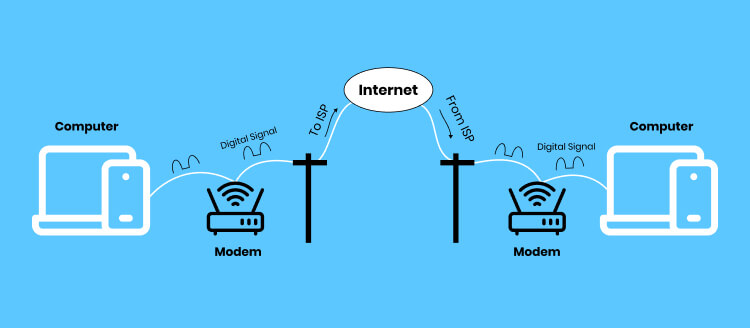
An ISP or internet service provider is a company or an organization that provides internet access to individual and business customers. ISP companies are organized in different forms such as privately owned, community-owned, non-profit, and commercial. People who subscribe to the services of an ISP pay a nominal fee to enjoy online services like playing video games, using social media, shopping from e-commerce stores, managing business-related activities, and a lot more.
Is ISP the Same As the WiFi Provider?
Often ISPs are confused with WiFi Providers but they are different. ISPs deliver internet services through broadband, satellite, or wireless channels. They provide the infrastructure and services that enable users to get internet access. On the other hand, WiFi providers offer wireless internet connectivity to users within a specified local network. The simplest example of a WiFi service is the Public WiFi Hotspots and even the private WiFi networks in homes. In layman’s language, we can say that ISPs provide broader internet services while WiFi providers focus specifically on wireless connectivity.
Can You Connect with the Internet Without an ISP?
The precise answer will be No, however, I’ll explain that as well. Whether you are a home user or an organization, your ISP is the entity that provides you with the necessary infrastructure to connect with the vast internet out there. In other words, an ISP is an intermediary that links your device with the broader internet. While there are alternatives, such as a cellular service or a LAN, to connect devices to the internet but they do come with limitations. All in all, an ISP remains the primary means to access the internet.
Evolution of ISPs
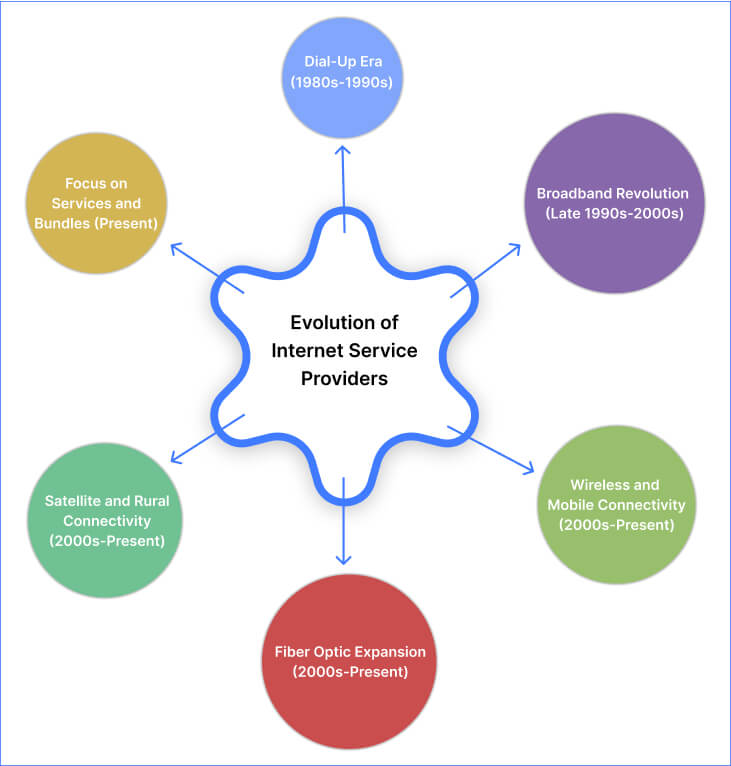
Access to the Internet began with dial-up connections. Here, users used to connect their computer devices with a telephone line and a modem to get access to the Internet. Not only the data transfer rates were slow, usually around 56 kbps, but often the connection was unreliable too.
Then happened the Broadband Revolution where ISPs began offering internet services DSL, Cable, and Fiber. The data transfer speeds improved significantly, usually around 1 Mbps. After this came wireless technologies like WiFi and cellular which gave rise to mobile ISPs for internet connectivity while on the go.
Then the Fiber Optic expansion took place through which users could access the internet at ultra-fast speeds (gigabit). Besides, fiber optic, new technologies like satellite internet for rural and remote areas emerged as an alternative. Since then, there has been no looking back and today we are witnessing services like 5G internet that offer peak speeds of 10 Gbps along with reliability and better capacity.
What is the Purpose of ISP?
We have already learned that ISPs facilitate internet access to users worldwide. However, besides this, ISPs offer some advantageous benefits to individuals and businesses which we are going to discuss below:
Essential Connectivity
Global Connectivity is one of the biggest benefits offered by ISPs. Through the Internet, a small business in a rural area can connect with customers across the globe. Remote collaboration is another significant advantage of having ISPs. Employees can connect just from anywhere and collaborate with their teams.
Variety of Options
No matter if you need internet access for business use or personal entertainment, your requirements are unique from others. ISPs provide a wide variety of options for internet connections such as DSL, Cable, Fibre, Optic, Satellite, etc. Furthermore, ISPs also offer a variety of data plans and speeds to cater to different requirements of their customers. You can easily choose a plan according to your budget, usage level, and type.
Reliable Services
Reputable Internet Service Providers ensure an excellent customer experience by offering high uptime and performance. They have automatic failover systems that can reroute traffic if one server goes down to ensure consistent internet access.
What are the Different Types of ISPs?
In the global internet hierarchy, ISPs are classified mainly into three categories as mentioned below:
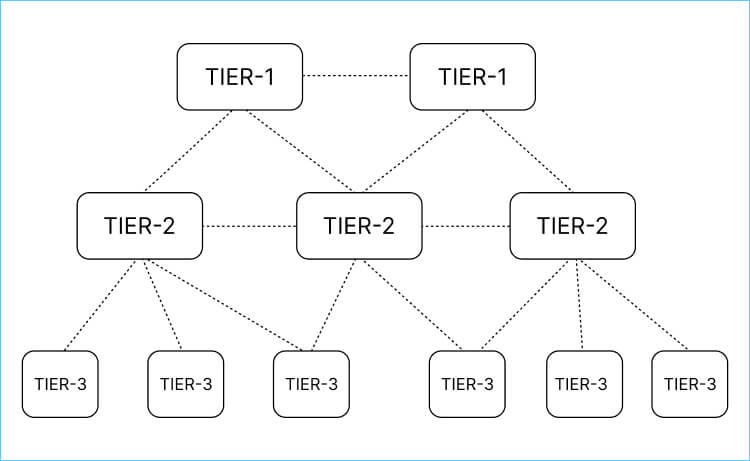
Tier 1 ISPs
They come at the top level having extensive global reach covering multiple regions and continents. They have enough physical network lines or peer directly with other Tier 1 ISPs to exchange traffic freely. Tier 1 ISPs invest heavily in setting up the infrastructure.
Tier 2 ISPs
Tier 2 ISPs operate within regional networks and connect with tier 1 ISPs to access the broader internet. This also means that Tier 1 ISPs sell their network access to Tier 2 ISPs. Other than this, Tier 2 ISPs may also partner with their counterparts i.e. Tier 2 ISPs for bandwidth exchange. These ISPs focus mainly on commercial and end users like homes, businesses, and individuals.
Tier 3 ISPs
The last category is Tier 3 ISPs which are responsible for connecting customers to the internet by peering agreements with higher-tier ISPs. Their focus is mainly on end-users.
Besides the Tier-Based hierarchy, ISPs are also solely classified based on the geographic scope of their operations.
Local ISP
These ISPs operate within a specific locality i.e. they provide internet connectivity to a small area which can be a city, town, or community. Their size and scale depend upon the defined geographic area.
Regional ISP
They serve more than one locality and have a customer base of more than 10K.
National ISP
A National ISP provides internet connectivity on a broader scale which could be an entire nation. They have heavy infrastructure and the capabilities to meet customer demands spanning multiple regions and states.
How Does ISP Work : How ISP Provide Internet?
Now we know that ISPs act as middlemen between you and the vast space of the Internet. But how does an ISP provide Internet? Here it is:
Network Infrastructure
ISPs maintain their own network infrastructure which includes various technologies like fiber optics, DSL, satellite links, or wireless connections. This infrastructure enables ISPs to connect with a global network called as Internet backbone. This is a high-capacity network where various ISPs and network providers are interconnected.
Obtaining IP Addresses
Internet service providers acquire blocks of IP addresses which they assign to their customers. These addresses allow data to be directed to the right destinations.
Providing Internet Access to Customers
Now as you, the customers, subscribe to the services of an ISP, it provides you with an internet connection based on your preferences in terms of speed, availability, etc. The ISP then assigns you an IP address which is your unique identifier on the internet.
Routing Your Traffic
When you type in a web address or click a link, your request travels through your ISP’s network. Here data is transmitted in the form of packets and ISP routers and switches transmit these packets to their intended destination. This process involves finding the best routing path for the data to reach its destination.
Delivery of Content
Once your request reaches the destination server, the requested information is sent back the same way which is ultimately received by your device.
What Information Can ISP See?
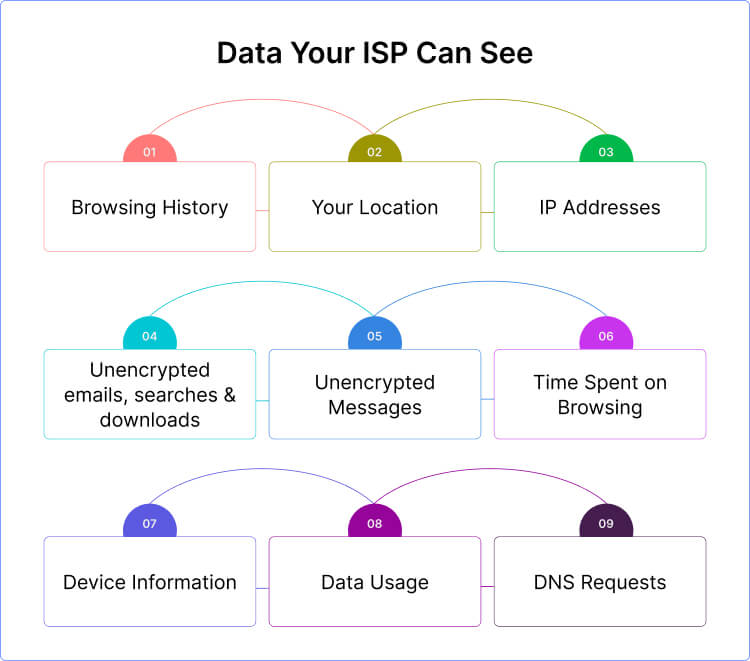
The information visible to ISPs usually includes your browsing history, IP addresses, DNS requests, Device Information, Connection Timestamps, Data Usage, and type of Traffic.
How to Start an Internet Service Provider Business?
Probably, the reason why you are reading this article is that you have been thinking about starting an internet service provider business. Though the market is already crowded, that doesn’t mean that new players cannot stand out. Trust me, the demand in this market is growing like never before which makes way for huge opportunities to get success.
With that in mind, let’s take a look at the criteria for how to start an internet service provider business. Here is a solid plan consisting of 9 important steps to quickly turn your idea of becoming an ISP into reality.
Your 9-Step Roadmap to ISP Business
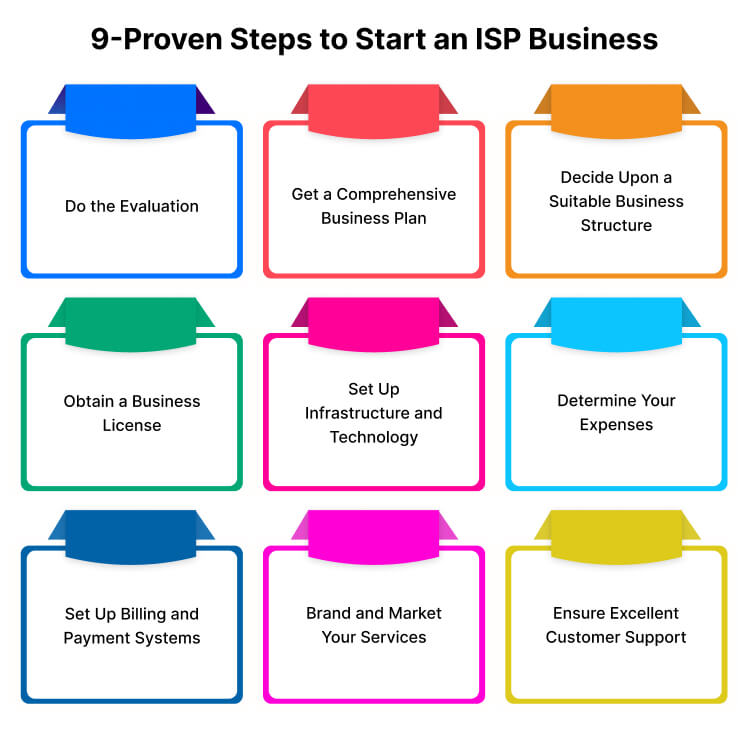
1. Do the Evaluation
Several aspects need to be evaluated. These include the following:
- Identify Your Target Area
Choose an underserved area with limited and unreliable access to the Internet.
- Determine Your Target Customer
Define your target customers based on age and gender.
- Determine the size of your Audience
Assess the population density in the target area to have an idea about your potential customer base.
- Analyze the Competition
Research the market and figure out your competitors or existing providers. Check and understand their service offerings. Some of the most popular and well-established names in the Internet Service Provider industry are AT&T, Cox Communications, Verizon, and many more. The below table lists the same:
Examples of Internet Service Providers
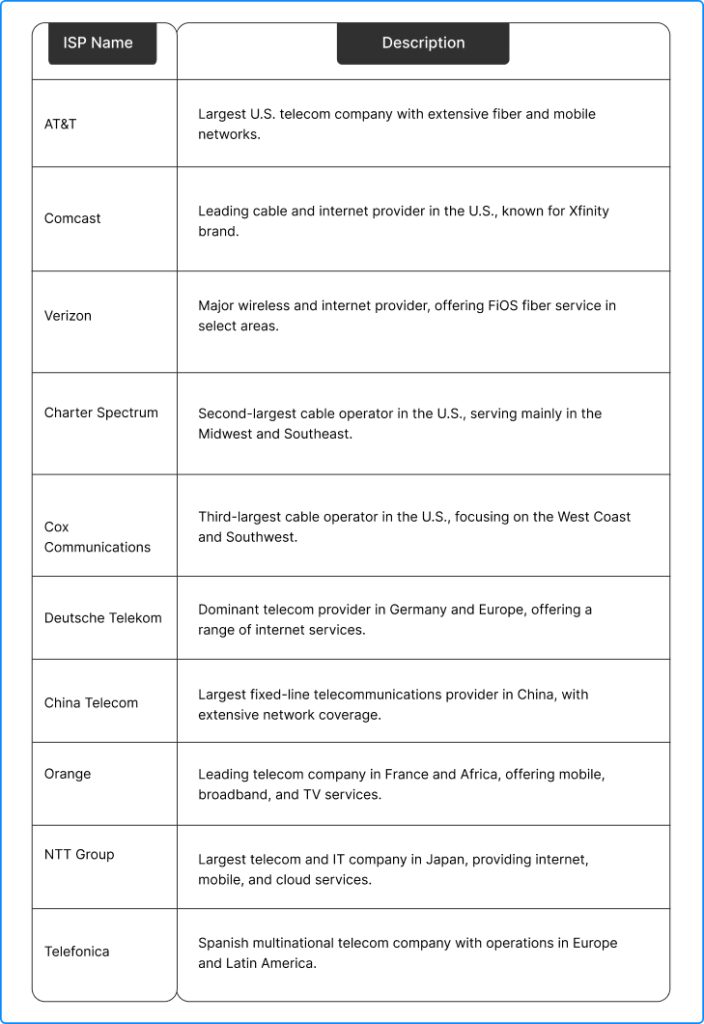
2. Get a Comprehensive Business Plan
Creating a business plan doesn’t guarantee your chances of success but it gives you a roadmap to stay focused and organized. Also, by outlining a plan you will be able to identify any potential issues that may arise later. Such a plan provides a clear vision for the future of business and can be your foundation to make the right decisions To create a good business plan for your internet service provider business, consider adding the following essential elements:
- What are your goals?
- Estimated amount of money you’ll need to start the business
- The number of employees you’ll need to hire
- How you will provide service to customers?
- How much will you charge for your services?
- How you will deal with problems like maintenance issues?
If you are still not sure how to generate a business plan, then there are many business plan generating services available online. You can try a few and see if it works up to your expectations.
Bonus Tip: You can explore traditional bank loans and angel investors for your funding needs. Also, don’t forget to check government grants or subsidies provided to ISPs serving in underserved areas.
3. Decide Upon a Suitable Business Structure
There are various options to choose from when it comes to “how you want to operate?” These are
- Sole Proprietorship: You are the boss – all profits and debts are yours.
- Partnership: Run by 2 or more people, share profits and debts based on agreement.
- LLC: Combines the liability protection of a corporation with the tax flexibility of a partnership.
- Corporation: Separate legal entity, owners not personally liable, subject to double taxation.
You can research each of these structures to figure out which one makes the most sense to you. Also, each structure comes with its own legalities, so it is a good idea to consult with an attorney to choose the best option.
4. Obtain a Business License
First, determine the necessary licenses and permits in your target area required to operate as an ISP. This includes permits for the installation and maintenance of network infrastructure. To apply for the license, you may need to visit the office of the local authorities or you may be able to apply online. Furthermore, while applying for the license, you will be required to provide some details related to your business. This includes:
- The name of your business
- What does your business offer?
- How does your business operate?
Usually, it takes around 4-8 weeks to receive a business license.
5. Set Up Infrastructure and Technology
Now you need a wholesale bandwidth provider. So finding the right Internet Provider is the next thing to do. For this, you can do your own research or ask experts for recommendations. Another crucial thing is – The type of network technology you will use. Figure out whether you want to use Fiber optic, Cable, or wireless. This process also demands you to design and deploy your infrastructure.
Different Types of Internet Connections Offered By ISPs
Below mentioned are the different technologies through which ISPs deliver their services:
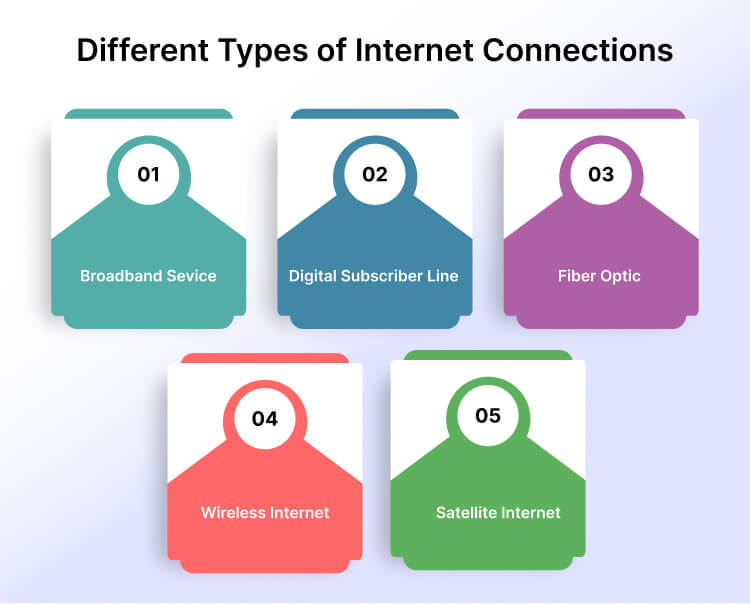
-
Broadband Service
It is high-speed internet access that transmits large amounts of data at high speeds. Broadband service can be delivered through DSL, fiber optic, cable modem, satellite, and wireless.
-
Digital Subscriber Line
In this type of internet connection, existing copper telephone lines are used to transmit digital data. DSL connections are usually faster than dial-up connections but slower than fiber optic internet.
-
Fiber Optic
the fiber optic internet makes use of thin strands of glass or plastic fiber to transmit data as pulses of light. the speed offered by this type of connection is usually high.
-
Wireless Internet
Also called WiFi, the wireless internet connection allows internet access to users without using physical cables. It makes use of wireless routers and radio signals for the transmission of data. Today, wireless internet is widely popular in residential and commercial sectors.
-
Satellite Internet
Often used in remote areas, Satellite internet delivers internet access by sending and receiving signals between satellite dishes installed at the user’s location and in the geostationary orbit above Earth. Compared to other internet connections, satellite internet can have higher latency and slower speeds.
6. Determine Your Expenses
Estimating the cost is perhaps the most important aspect of business planning. The bandwidth supply service makes up a major part of your expenses. Once that is finalized, it would be wise to estimate the other costs, such as
- Cost of area or room to keep data servers
- Cost of bulk bandwidth
- Cost of hardware/software
- Cost of marketing and sales
- Cost of service
7. Set Up Billing and Payment Systems
For seamless working of your Internet Service Provider Business, it is important to manage customer subscriptions, payments, and invoicing efficiently. A CRM software would be a good choice to track customer information, service requests, and billing. Also, choose a reliable billing system to handle customer payments and billing.
8. Brand and Market Your Services
Create a marketing strategy about how you will reach your target audience. There are several ways through which you can promote your services including ads on local TV, sending flyers, social media marketing, email marketing, etc. Last, but not least, get a website for your business to create a solid brand identity.
9. Ensure Excellent Customer Support
Your customers will be the driving force behind your business. The more happy and satisfied they will be with your service, the more your business will thrive. So make sure you invest time and effort in creating a skillful customer support team. They must ensure that customer queries are resolved as quickly and efficiently as possible.
ISP Glossary: Common Terms Related to Internet Service Providers
In the realm of Internet Service Providers, there are a lot of technical terms that you might come across. Here are some of the most common terms for you to learn about:
1. Bandwidth
It is the capacity of a network to transmit data, measured in bits per second (bps) or megabits per second (Mbps).
2. Router
It is a device that forwards data packets between computer networks, often used to create local networks in homes or businesses.
3. Modem
It is a device modulating and demodulating analog signals, enabling digital devices to communicate over analog telephone lines.
4. IP Address
it is a numerical address assigned to each device connected to a computer network that uses the Internet Protocol for communication.
5. DNS
A system translating human-readable domain names into numerical IP addresses.
6. Packet
A unit of data transmitted over a network, often broken down into smaller packets for efficient transmission
Start Your ISP Business: Wrapping Up!
From all that I have explained above, it is clear that starting an ISP business requires a significant amount of upfront investment in terms of time, money, and resources. According to IBISWorld, There are 27,978 Global Internet Service Providers businesses as of 2024, an increase of 4.4% from 2023. Furthermore, South East Asia (17 businesses), Europe (17 businesses), and North America (15 businesses) are the regions with the most number of Global Internet Service Providers businesses.
It is high time you also start an internet service provider business to meet the growing demand for internet connectivity. Good luck on your entrepreneurial journey.